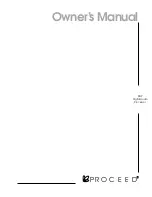
Signal Descriptions
Serial Audio Interface (SAI)
MOTOROLA
DSP56012 User’s Manual
2-17
2.8.2
SAI Transmit Section
The transmit section of the SAI has five dedicated signals.
Table 2-9
Serial Audio Interface (SAI) Transmit Signals
Signal
Name
Signal
Type
State
during
Reset
Signal Description
SDO0
Output
Driven
high
Serial Data Output 0
—SDO0 is the transmitter 0 serial output.
SDO0 is driven high if transmitter 0 is disabled, during
personal reset, hardware reset and software reset, or when the
chip is in the Stop state.
SDO1
Output
Driven
high
Serial Data Output 1
—SDO1 is the transmitter 1 serial output.
SDO1 is driven high if transmitter 1 is disabled, during
personal reset, hardware reset and software reset, or when the
chip is in the Stop state.
SDO2
Output
Driven
high
Serial Data Output 2
—SDO2 is the transmitter 2 serial output.
SDO2 is driven high if transmitter 2 is disabled, during
personal reset, hardware reset and software reset, or when the
chip is in the Stop state.
SCKT
Input
or
Output
Tri-stated
Transmit Serial Clock
—This signal provides the clock for the
Serial Audio Interface (SAI). The SCKT signal can be an output
if the transmit section is programmed as a master, or a
Schmitt-trigger input if the transmit section is programmed as
a slave. When the SCKT is an output, it provides an internally
generated SAI transmit clock to external circuitry. When the
SCKT is an input, it allows external circuitry to clock data out
of the SAI.
SCKT is tri-stated if all transmitters are disabled (personal
reset), during hardware reset, software reset, or while the chip
is in the Stop state. No external pull-up is necessary.
WST
Input
or
Output
Tri-stated
Transmit Word Select
—WST is an output if the transmit
section is programmed as a master, and a Schmitt-trigger input
if programmed as a slave. WST is used to synchronize the data
word and select the left/right portion of the data sample.
WST is tri-stated if all transmitters are disabled (personal
reset), during hardware or software reset, or while the chip is
in the Stop state. No external pull-up is necessary.
Summary of Contents for DSP56012
Page 12: ...xii Motorola ...
Page 20: ...xx Motorola ...
Page 21: ...MOTOROLA DSP56012 User s Manual 1 1 SECTION 1 OVERVIEW ...
Page 40: ...1 20 DSP56012 User s Manual MOTOROLA Overview DSP56012 Architectural Overview ...
Page 41: ...MOTOROLA DSP56012 User s Manual 2 1 SECTION 2 SIGNAL DESCRIPTIONS ...
Page 61: ...SECTION 3 MEMORY OPERATING MODES AND INTERRUPTS ...
Page 81: ...MOTOROLA DSP56012 User s Manual 4 1 SECTION 4 PARALLEL HOST INTERFACE ...
Page 148: ...4 68 DSP56012 User s Manual MOTOROLA Parallel Host Interface Host Interface HI ...
Page 149: ...MOTOROLA DSP56012 User s Manual 5 1 SECTION 5 SERIAL HOST INTERFACE ...
Page 179: ...MOTOROLA DSP56012 User s Manual 6 1 SECTION 6 SERIAL AUDIO INTERFACE ...
Page 205: ...MOTOROLA DSP56012 User s Manual 7 1 SECTION 7 GPIO ...
Page 210: ...7 6 DSP56012 User s Manual MOTOROLA GPIO GPIO Register GPIOR ...
Page 211: ...MOTOROLA DSP56012 User s Manual 8 1 SECTION 8 DIGITAL AUDIO TRANSMITTER ...
Page 226: ...8 16 DSP56012 User s Manual MOTOROLA Digital Audio Transmitter DAX Programming Considerations ...
Page 233: ...MOTOROLA DSP56012 User s Manual B 1 APPENDIX B PROGRAMMING REFERENCE ...
















































